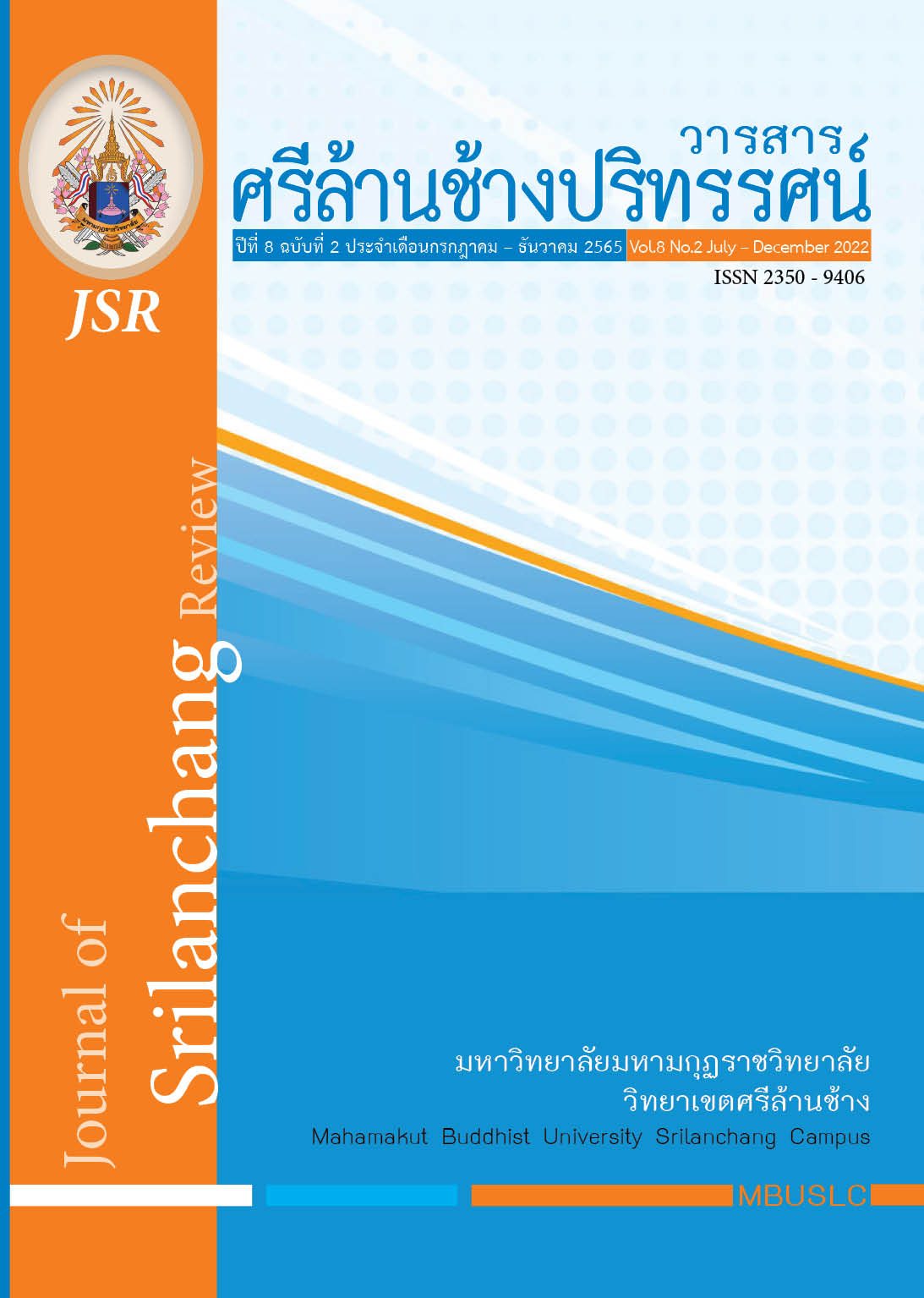THE GUIDELINES FOR LEADERSHIP DEVELOPMENT ACCORDING TO THE DUTIYAPAPANIKA SUTTA OF PHRAPARIYATTIDHAMMA SCHOOL ADMINISTRATORS IN NONG KHAI PROVINCE
Main Article Content
Abstract
The objectives of this research to study were: 1) the leadership in the Dutiyapapanika Sutta of Phrapariyattidhamma school administrators in Nong Khai Province; 2) the methods of leadership development according to the Dutiyapapanika Sutta of Phrapariyattidhamma school administrators in Nong Khai Province; 3) to propose guidelines for leadership development according to the Dutiyapapanika Sutta of Phrapariyattidhamma school administrators in Nong Khai Province. This study was carried out by means of mixed-method research. It consisted of distributing questionnaires to 182 administrators and teachers teaching in Phrapariyattidhamma Schools in Nong Khai Province. The obtained data were analyzed using basic statistics such as Mean and Standard Deviation, presented in a table with a description. The qualitative research consisted of 1) data analysis by content analysis and 2) interviews of 15 key informants.
The research results were as follows:
1) The mean value of the leadership in the Dutiyapapanika Sutta of Phrapariyattidhamma school administrators in Nong Khai Province was statistically rated at a high level in all studied aspects.
2) The leadership development methods according to the Dutiyapapanika Sutta of Phrapariyattidhamma school administrators in Nong Khai Province were that the administrators should be a leader with an inclusive vision and should use the Dhamma principles and ideas that are consistent with future trends. They should be able to manage work well and have expertise in the job. They should be determined to manage to achieve goals, have a clear human relationship.
3) The guidelines for leadership development according to the Dutiyapapanika Sutta of Phrapariyattidhamma school administrators in Nong Khai Province, corresponding to the interview results of 15 experts and teachers of the educational institutions, were as follows:
(1) Cakkhumā: the administrators should have a vision per the Dutiyapāpaṇika Sutta with knowledge, well-rounded vision, proper knowledge, broad knowledge, profound knowledge.
(2) Vidhūro): the administrators should have a suitable learning plan, should be diligent, skillful, determined, and patient to support and follow-up.
(3) Nissayasampanno: the administrators should understand the problems that may arise during the work, they should understand people and use the right person.
Article Details

This work is licensed under a Creative Commons Attribution-NonCommercial-NoDerivatives 4.0 International License.
บทความที่ได้รับการพิจารณาจากคณะกรรมการผู้ทรงคุณวุฒิและเผยแผ่ในวารสารฉบับนี้ เป็นทัศนคติและข้อคิดเห็นส่วนบุคคลของผู้เขียนแต่ละท่าน ไม่ถือว่าเป็นทัศนะคติและความรับผิดชอบ
ของบรรณาธิการ
บทความ ข้อมูล เนื้อหา รูปภาพ ฯลฯ ที่ได้รับการตีพิมพ์ในวารสารศรีล้านช้างปริทรรศน์ ถือเป็นลิขสิทธิ์ของวารสารศรีล้านช้างปริทรรศน์ หากบุคคลหรือหน่วยงานใดต้องการนำทั้งหมดหรือส่วนหนึ่งส่วนใดไปเผยแพร่ต่อหรือเพื่อกระทำการใด ๆ จะต้องได้รับอนุญาตเป็นลายลักอักษรจากวารสารศรีล้านช้างปริทรรศน์ ก่อนเท่านั้น
References
ณัฐวุฒิ ภารพบ. (2554). การพัฒนาภาวะผู้นำเชิงกลยุทธ์ของผู้บริหารโรงเรียนเอกชนในจังหวัดภาคใต้. ดุษฏีนิพนธ์ ปริญญาศึกษาดุษฏีบัณฑิต สาขาวิชาภาวะผู้นำทางการบริหารการศึกษา. บัณฑิตวิทยาลัย : มหาวิทยาลัยทักษิณ.
พรนพ พุกกะพันธ์. (2555). ภาวะผู้นำและการจูงใจ. กรุงเทพมหานคร: จามจุรีโปรดักท์.
พระพรหมบัณฑิต (ประยูร ธมฺมจิตฺโต ป.ธ.9. Ph.D.). พุทธวิธีในการบริหาร. กรุงเทพมหานคร: พิฆเณศพริ้นตริ้งเซ็นเตอร์.
พระครูสังฆรักษ์จักรกฤษณ์ ภูริปญฺโญ (กัติยัง). (2557). พุทธวิธีการสร้างรูปแบบภาวะผู้นำเชิงพุทธของผู้บริหารการศึกษาในมหาวิทยาลัยมหาจุฬาลงกรณราชวิทยาลัย จังหวัดพระนครศรีอยุธยา. วิทยานิพนธ์ ปริญญาพุทธศาสตร์ดุษฏีบัณฑิต สาขาพุทธบริหารการศึกษา. บัณฑิตวิทยาลัย : มหาวิทยาลัยจุฬาลงกรณราชวิทยาลัย.
ราตรี ศรีไพรวรรณ. (2557). กลยุทธ์การพัฒนาภาวะผู้นำผู้บริหารระดับกลางโรงเรียนมาตรฐานสากล. รายงานการศึกษาส่วนบุคคล หลักสูตรพัฒนาบริหารระดับสูง สถาบันพัฒนาครู คณาจารย์ และบุคลากร ทางการศึกษา(นบส.ศธ.). รุ่นที่ 4, กระทรวงศึกษาธิการ.
รัตติกรณ์ จงวิศาล. (2564). ภาวะผู้นำ (Leadersip). ออนไลน์. สืบค้นเมื่อ 27 มีนาคม 2565. แหล่งที่มา http://bananatraining.com/ดูบทความ-47837-1-การพัฒนาภาวะความเป็นผู้นำ.html.
วิเชียร แสงไสย์. (2553). สภาพปัญหาการบริหารโรงเรียนพระปริยัติธรรม แผนกสามัญศึกษา จังหวัดหนองคาย. ปริญญาครุศาสตรมหาบัณฑิต (การบริหารการศึกษา). คณะครุศาสตร์ มหาวิทยาลัยราชภัฏสารคาม.
วิโรจน์ สารรัตนะ. (2557). ภาวะผู้นำ ทฤษฎีและนานาทัศนะร่วมสมัยปัจจุบัน. กรุงเทพฯ :ทิพย์วิสุทธิ์. สำนักพิมพ์วิโรจน์ สารรัตนะ.
สุวิมล โพธิ์กลิ่น. (2560). การบริหารสถานศึกษายุคใหม่ที่มีประสิทธิผล. (พิมพ์ครั้งที่ 1). อุบลราชธานี: ยงสวัสดิ์อินเตอร์กรุ๊ป.
สุภางค์พิมพ์ คล้ายธานี. (2557). “การพัฒนาภาวะผู้นำในการสื่อสารตามแนวทางพระพุทธศาสนา”. วิทยานิพนธ์ พุทธศาสตรดุษฏีบัณฑิต. (บัณฑิตวิทยาลัย: มหาวิทยาลัยมหาจุฬาลงกรณราชวิทยาลัย).
เสริมศักดิ์ วิศาลาภรณ์. (2557). ภาวะผู้นำ ทฤษฎีและแนวทางปฏิบัติในการบริหารการศึกษา หน่วยที่ 5. พิมพ์ครั้งที่ 2. กรุงเทพมหานคร: มหาวิทยาลัยสุโขทัยธรรมาธิราช.


